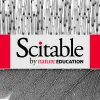Take a look inside 4 images
Scitable
Pros: There's scientifically accurate information, great teacher tools, and social media connections with the scientific community.
Cons: It can be challenging to find help features; more support for struggling readers and ELLs would be nice.
Bottom Line: Good resource for teachers looking to make a virtual classroom; the articles on current issues in science are great for more advanced students.
Teachers of advanced science students will appreciate the authentic nature of the articles, all of which are written and reviewed by scientists. The Scientific Communication topic room is great for students who are completing research projects, and the Career Planning room has tons of information about scientific careers. Teachers of more basic science can use the blog posts, Spotlights, and Knowledge Project sections to highlight science issues in everyday life -- all important for building students' interest in science.
Another useful aspect here is teachers' ability to set up a virtual classroom, which allows the creation of a custom online reading list. Teachers can assign Scitable's articles, post and moderate discussion groups, and create a science news feed. Teachers can also use and assign ebooks, or modify an existing one by rearranging or adding their own information, including web links and references.
Scitable is a searchable database of articles, blogs, and discussion groups focusing mainly on genetics, cell biology, scientific communications, and scientific career planning. The topic rooms have article listings, discussion groups, and ebooks (with detailed introductions for the various topics). Mainly a college-level resource, articles are often labeled as basic (intro university), intermediate, or advanced (graduate level). There's also a library of video resources, including content animations and interviews with scientists, and a built-in social media function to help build interest in the scientific community.
Standout features include the Ask an Expert page, which allows students to question and get an answer from a practicing scientist within 48 hours, and the Career Planning topic room, which is an excellent resource for students who want to pursue a future in science.
Teachers should know that the articles here are written at a college level (and beyond), making the site appropriate mostly for advanced high schoolers. There are a few embedded language supports, like graphics and a rollover scientific glossary for each article. A convenient search from the home page brings up a list of related definitions, articles, blogs, images, and discussions, making it easy to access the site's various resources. Alternately, content found in the Knowledge Project section comes at a more basic reading level -- it's accessible to a wider range of students. But the subjects here differ from those in the main topic rooms mentioned above, and they're covered in less depth.
Students may have trouble finding help, as there aren't obvious links to the site's help topics, setup tutorials, or the Ask an Expert feature. The most obvious help features are a FAQ page (accessed through a tiny contact link at the bottom of the main page) and a short tutorial accessed from the multimedia page. Clearer access to support features would make the site more accessible to a wider range of students.











